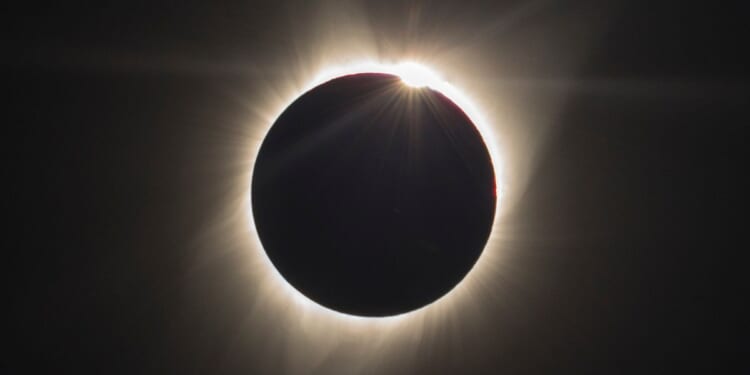They have good reasons for doing it. And we have good reasons for not trusting them.
Sometimes, two seemingly contradictory statements each contain essential truths.
Last week, Republican Gov. Eric Holcomb, of Indiana, signed Executive Order 24-05, a statewide disaster emergency declaration in advance of Monday’s expected total solar eclipse.
Parts of Indiana lay in the eclipse’s path of totality. For that reason, Holcomb predicted “several hundred thousand visitors” to the state.
If that happens, then the massive influx of people “may well stress and/or interfere with first responder and public safety communications and emergency response systems such that a technological or other emergency may occur,” Holcomb’s order read.
Fortunately, according to WLS, Indiana’s membership in the Emergency Management Assistance Compact allows it to call on other member states for resources.
Indiana has not seen a total solar eclipse since 1869 and will not see another until 2099.
Thus, officials in The Hoosier State and elsewhere have begun preparations for a once-in-a-lifetime event.
Chairman Shaun Gilliant, of the Essex County New York Board of Supervisors, for instance, explained that he and other county officials declared a state of emergency in anticipation of heavy traffic and even cellular service disruptions, according to NBC 5 in New York.
Will you be in the path of the total eclipse?
According to WHIO in Dayton, Ohio, the city council in nearby Riverside will decide at Thursday night’s meeting whether to declare a temporary emergency.
“The City of Riverside is expected to more than double its population for this event,” the city said last month.
In other words, state and local officials across the path of totality expect an event that will tax their normal resources.
Richard Fienberg, of the American Astronomical Society’s Solar Eclipse Task Force, put that event in an understandable context.
“Having a total solar eclipse pass through the U.S. is kind of like having 20 or 30 Super Bowls happening all at once,” Fienberg said according to Time.
State and local officials, therefore, appear to have taken appropriate action in advance of the big event.
In so doing, however, some officials might have either observed or anticipated a curious reaction from a skeptical public.
“This is nothing negative about the eclipse,” county administrator Robert Hagemann of Jefferson County, New York, told WWNY-TV in an email.
That kind of reassurance says less about the emergency declarations than it does about the times in which we live.
For instance, during the total eclipse, sky watchers might also catch an otherwise impossible daytime glimpse of the Pons-Brooks comet. As it approached the sun in July, the cryovolcanic comet spewed gas and ice that gave it the appearance of having horns, which led to the nickname “devil’s comet.”
Total solar eclipses occur only rarely. And Monday’s eclipse might make visible a “devil’s comet” that passes Earth about once every 71 years.
Could God be sending his sinful children a celestial message?
Indeed, The Washington Times observed that social media had caught fire with “sensational conspiracy theories,” some of which “draw spurious connections between scriptural verses and the upcoming eclipse.”
The Times, of course, dismissed those theories as “unsupported by empirical evidence and stem[ming] from a misinterpretation of astronomical events.” And they may well be.
On the other hand, God could hardly choose a more appropriate time to warn us of the need for repentance.
Furthermore, dismissing “sensational conspiracy theories” misses the twofold point.
First, from the assassination of President John F. Kennedy to the federal government’s COVID-era censorship of information that powerful people found inconvenient to their fear-mongering narrative, the conspiracy theorists have a far better truth-telling record than does the establishment media.
Second, state and local officials — to say nothing of the tyrannical federal government — do not deserve citizens’ trust. After what they did during COVID, for instance, they can do nothing without arousing rightful suspicion of their motives.
In short, government officials certainly can justify eclipse-related emergency declarations.
But we also know what they are capable of doing to us. So we must never trust them for any reason.


